Search Results for 'turtle farm'
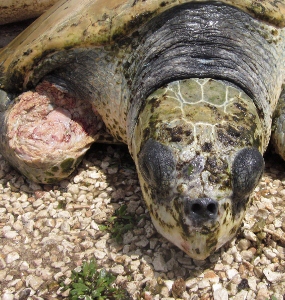
Turtle Farm stands by commissioned report
 (CNS): Following a statement by animal activist group, the WSPA, Monday, expressing its disapproval of a report commissioned by the Cayman Turtle Farm regarding the various welfare concerns at the facility the management said Tuesday it believes the findings are valid and based on the expert opinion of qualified scientists. The CTF said the report was independent and followed an intensive inspection of the facility in the wake of concerns raised by the animal welfare charity last year. The CTF said it has asked the WSPA to accept the report as a basis for dialogue but it has refused and the farm’s managing director said this was preventing the two parties from moving forward.
(CNS): Following a statement by animal activist group, the WSPA, Monday, expressing its disapproval of a report commissioned by the Cayman Turtle Farm regarding the various welfare concerns at the facility the management said Tuesday it believes the findings are valid and based on the expert opinion of qualified scientists. The CTF said the report was independent and followed an intensive inspection of the facility in the wake of concerns raised by the animal welfare charity last year. The CTF said it has asked the WSPA to accept the report as a basis for dialogue but it has refused and the farm’s managing director said this was preventing the two parties from moving forward.
“The difficulty with trying to engage in a dialogue with WSPA is finding an agreeable direction for dialogue to proceed toward. WSPA proposed that CTF must stop visitors touching or holding turtles, and that CTF must stop farming turtles for meat,” he said. “Neither of those are end-goals that CTF is in a position to negotiate, as they would each be contrary to CTF’s remit to provide a highly attractive unique visitor experience and to provide a source of farmed turtle meat which preserves Caymanian culinary traditions and helps to preserve turtles in the wild. We believe however that pursuing the recommendations of the inspection report would have been a very worthy objective for our dialogue to be aiming towards.”
As part of the report the inspectors made some recommendations for improvement, which the CTF has said it is now working on but the Farm and the World Society for the Protection of Animals (WSPA) have some fundamental disagreements. The charity rejects the legitimacy of the independent review on a number of grounds. Although they recognize the authors of the report as experts in the field of sea turtle biology they are concerned about the lack of detail and explanation in the report to back their conclusions. In addition, they suggest some bias but the CTF said none of the scientists who are “credible, conscientious internationally-recognized experts,” have been paid by the Farm.
The impasse also focuses on the CTF’s position that it will not accept the findings of the WSPA on which it has based its campaign to turn the farm into a conservation facility and move away from farming. The CTF said the WSPA report was based on limited observation and second-hand reports, despite extensive photographic evidence.
The WSPA claims that the independent inspection report “lacked detail and was not broad enough to be treated as an authoritative piece of work” – however, CTF points out that the same can be said of the WSPA research. The CTF believes that the methods the charity used in its case study are incomplete, as their research in Cayman was verylimited and conducted as part of an “undercover investigation” without the cooperation of the CTF.
The CTF said the four experts who produced the independent report were given full access to the Turtle Farm, its staff and records, and were able to take time to inspect the turtles in all the tanks both on the public display side and the “production” side of the farm. “Unlike the WSPA, the inspectors were not relying on clandestine practices or on photographs to try and give some interpretation of the actual situation with the turtles at the farm,” the farm said.
“These respected scientists were not going to risk their professional reputations by making a report that they were not confident had solid basis in facts that they could inspect for themselves,” Adam added.
Meanwhile, the farm is now pursuing the recommendations and issues highlighted by the report. It said the recruitment of a full-time Veterinarian and a Farm Manager is imminent and it has implemented a different type of treatment for skin lesions with very encouraging results. It has also adjusted feeding protocols to rectify what is said was moderate emaciation observed in some turtles and has increased hatchling tank capacity through the completed construction of additional hatchling tanks in time for the upcoming breeding season.
Necropsies are also being performed on turtle mortalities and tissue samples are banked for future pathology work. It is anticipated that this work will be done by CTF’s in-house veterinarian and through arrangements with overseas experts. As a long-term measure to continue improvements and evaluate the success of the Farm, a Scientific Advisory Committee is now being set up to oversee, review and make recommendations on the CTF’s improvement goals, farming and research operations.
However, the fundamental issue that is between the farm and the charity is that of animal welfare and the fact that turtles are not domesticated animals. The WSPA will be stepping back up its campaign for the Cayman and the international community to put pressure on the farm management and local politicians to put an end to the farming itself and move towards conservation only AT THE FACILITY.
Wth almost no political support for closing down the farming part of the operation and a continuing appetite for turtle meat the WSPA’s goal remains elusive regardless of its efforts and considerable international support.
Although the CTF sucks in some $10million of public money and is something of a political football, this surrounds the expansion of the farm into a wider tourist attraction which has been a costly exercise. The farming of meat is not the source of the financial losses at the facility which is caused by lower than hoped for visitor numbers to the now more costly attraction.
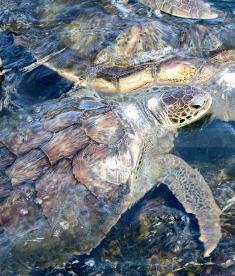
Turtle farm still polluting sea
 (CNS): Despite the requirements of its licence, the Cayman Islands Turtle Farm is still polluting the ocean, its 2011 annual report has revealed. Among the many other problems facing the beleaguered West Bay facility, the auditors confirmed that the farm is essentially bankrupt and kept afloat only by injections of capital from the public purse and from loans guaranteed by government — by extension the Caymanian taxpayer. The report reveals that the farm, which is currently under pressure from international animal rights groups, earned even less revenue in 2011 than the year before, despite various efforts to stop the rot, creating a growing bill for an already financially strapped government.
(CNS): Despite the requirements of its licence, the Cayman Islands Turtle Farm is still polluting the ocean, its 2011 annual report has revealed. Among the many other problems facing the beleaguered West Bay facility, the auditors confirmed that the farm is essentially bankrupt and kept afloat only by injections of capital from the public purse and from loans guaranteed by government — by extension the Caymanian taxpayer. The report reveals that the farm, which is currently under pressure from international animal rights groups, earned even less revenue in 2011 than the year before, despite various efforts to stop the rot, creating a growing bill for an already financially strapped government.
According to the latest annual report, which was audited by KPMG, the farm remains at risk from potential legal action after its failure to acquire the correct environmental permits between 2007 and 2008. This has left the company exposed to possible litigation and the imposition of fines. However, when the audit was undertaken KMPG stated that so far there has been no legal action initiated against the company or any fines levied.
By July 2009 a two-year permit was eventually granted to the Turtle Farm for its effluent discharge but under the terms of the licence it was obligated to reduce this by some 50%, which the auditors say the farm has not done. Despite engaging external consultants to assist in complying with the terms of the permit and the relevant environmental laws, the farm has still failed to meet the required reduction in the waste and pollution it discharges into the ocean.
The report indicates that the farm has not been able to meet the effluent reduction goals of its permit “as a result of the cutbacks and cost constraints” on the facility. It concluded that the company needed to make a significant capital investment to install a system appropriate to meet the requirements. However, management has also decided that the system originally recommended would not necessarily meet its requirements and could have an adverse impact on air quality in the community, which it believes may be even worse than the pollution in the ocean.
In addition, during 2011 the farm hemorrhaged even more cash as profits plummeted, the report reveals. Gross profit at the farm was $3.6 million in 2011 compared with $4.6million in 2010. Although expenses at the farm decreased, there was still a significant loss of almost $8 million — a bill picked up by the local taxpayer.
In their assessment of the farm the auditors made it clear that, without the continued support from the public purse, the facility could not continue as a going concern. In total government was forced to inject $9.8 million in 2011 to keep the tourist facility open.
KPMG said that the cost overruns of the development of the facility, lower than projected visitor numbers and operating costs in excess of the initial budget had all given rise to significant business risks that cast uncertainty over the company's ability to continue.
The farm has suffered significant operational losses since the 2006 financial year ended, shortly after the controversial redevelopment of the complex was completed. As a result, the company is unable to discharge its obligations as they become due in the ordinary course of business without recourse to lending, which was only secured via a guarantee from government — essentially the wider public.
The results of the 2011 financial year, the auditors said, indicate that the company continues to generate significant losses from operations and is experiencing serious cash flow difficulties, despite efforts to address the problem, which have included increasing the price of turtle meat and considering the possibility of selling turtle shells. In 2010 the company laid off 20 workers and during the 2011 financial year it reduced the remaining staff’s salaries by as much as 15% for some people.
The farm is currently undergoing an independent review in the face of an international animal rights group's findings of inhumane treatment, overcrowding, poor water conditions and general husbandry, cannibalism, disease and injury among the turtle population, as well as other worrying charges.
The farm has denied the accusations and commissioned a report, which has now been completed, but it has not made it clear when or if the public will see the final results.
Copies of the annual report do not appear on the Cayman Turtle Farm's website. However, they are available in hard copy from the Legislative Assembly and should also be available on request at the Cayman Turtle Farm in West Bay. (If any CNS reader has a copy of the report and has the time and resources to scan the document, we'll be happy to publish.)
Vote in the CNS poll: What should government do with the Turtle Farm?
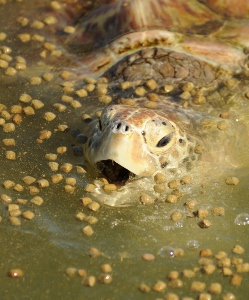
Short film released about turtle farm controversy
 (CNS): A short film has been released by the UK based environmental affairs magazine The Ecologist highlighting the controversies surrounding the Cayman Islands Turtle Farm. The short feature comes in the wake of an independent review of the farm commissioned by the farm’s management following the publication of findings by the World Society for the Protection of Animals (WSPA) that indicated things at the facility were less than ideal. The review has not yet been published. Animal rights and conservation activists have launched an international campaign to persuade the local authorities to turn the Farm into a real conservation facility and put an end to the farming of sea turtles.
(CNS): A short film has been released by the UK based environmental affairs magazine The Ecologist highlighting the controversies surrounding the Cayman Islands Turtle Farm. The short feature comes in the wake of an independent review of the farm commissioned by the farm’s management following the publication of findings by the World Society for the Protection of Animals (WSPA) that indicated things at the facility were less than ideal. The review has not yet been published. Animal rights and conservation activists have launched an international campaign to persuade the local authorities to turn the Farm into a real conservation facility and put an end to the farming of sea turtles.
Alongside the film and the campaign by the WSPA, whose own damning report alleged overcrowding, disease, injury, poor husbandry conditions and a catalogue of other problems, some UK MPs have also filed a motion in the British parliament with the backing of some 65 members from across the political spectrum, calling for action on the WSPA findings.
The film published on Thursday by The Ecologist, which was founded in the 1970s and is the oldest conservation and environment related publications in the UK, examines the WSPA findings and talks to the local department of environment and the farm’s director.
The Cayman Turtle Farm, which costs local tax payers some $10 million in subsidies every year, is the last of its kind in the world and is now undergoing international pressure to change its model. Undercover footage shot by the WSPA, which is featured in the film shows some of the issues at the heart of the campaign. As well as the welfare concerns the film highlights the risks to human health, financial costs and the alleged failures in its conservation mandate.
Since the WSPA first turned its attention on the Farm, officials there have persistently denied the allegations of cruelty. The farm has defended the conditions, its history and its research and conservation programme, stating the farm is a facility the Cayman Islands 'can be proud of'. It has also accused activists of attempting to undermine the farms revenue base whilst at the same time stating they want to work with the farm.
A review was carried out at the Farm in December and officials said that results of that review were expected this month but it is not clear when it will be released to the public.
The film includes comments from the farm’s MD Tim Adam, Gina Ebanks-Petrie, the environment department’s director as well as local marine personality Guy Harvey and local restaurant owner Isley Ebanks among others.
For more info visit: www.theecologist.org
See related stories on CNS: Cayman-turtle-farm-undergoes-review

Turtle Farm defends independence of review
 (CNS): Contrary to the statement from the World Society for the Protection of Animals (WSPA) about the review of the Cayman Turtle Farm (CTF), the local attraction said Wednesday that it was an unbiased and independent investigation, with the primary goal to determine if standards of care meet those required to ensure that the operation is conducted in a “humane manner”. The farm stated that the terms of reference directly related to the welfare of the turtles, and matched the areas of concern alleged by the WSPA in the report. “We therefore are at a loss to understand why the WSPA claims the review does not have the welfare of the turtles in the care of the Cayman Turtle Farm at heart,” the Farm stated in a release.
(CNS): Contrary to the statement from the World Society for the Protection of Animals (WSPA) about the review of the Cayman Turtle Farm (CTF), the local attraction said Wednesday that it was an unbiased and independent investigation, with the primary goal to determine if standards of care meet those required to ensure that the operation is conducted in a “humane manner”. The farm stated that the terms of reference directly related to the welfare of the turtles, and matched the areas of concern alleged by the WSPA in the report. “We therefore are at a loss to understand why the WSPA claims the review does not have the welfare of the turtles in the care of the Cayman Turtle Farm at heart,” the Farm stated in a release.
On Monday the WSPA said it had concerns that the review team was compromised of at least two members that had worked with the farm in the past and that there were no animal welfare experts on the team. The WSPA was also concerned about the standards to which the Cayman Turtle Farm would be held.
However, CTF said that as it is a completely unique facility with nothing to compare to, the terms of reference had to be based on the standards of practice that would apply to a comparable intensive livestock facility.
“The WSPA takes issue with this, arguing that the turtle is not a domesticated species. However, neither were pigs, cows or chickens – until they were in fact farmed and domesticated,” the Farm said.
CTF also stated that the four inspectors are all well-known turtle experts and members of the International Union for the Conservation of Nature (IUCN) Marine Turtle Specialist Group (MTSG).
George Balazs, a sea turtle scientist with 40 years of professional experience, has published over 100 journal papers on sea turtles. He has been a member of the IUCN Marine Turtle Specialist Group since 1976, and is currently the MTSG Vice-Chair for the Pacific Islands Region.
Dr Annette Broderick is a Senior Lecturer in Conservation Biology. She has been researching marine turtle populations for over 20 years, with much of her work focusing on the UK Overseas Territories, including the Cayman Islands. Her research focuses on the conservation and monitoring of marine turtle populations, in particular reproductive investment; impacts of temperature on hatchling production; migration and navigation of adults and the management of marine turtle harvests. She is a member of the IUCN Marine Turtle Specialist Group.
Dr Thierry Work is a veterinarian, and a wildlife disease expert with 20 years of professional experience on diseases of sea turtles. He is credited with over 40 journal papers on sea turtles. He is a member of the IUCN Marine Turtle Specialist Group and the IUCN Wildlife Health Specialist Group (WHSG).
Professor Brendan Godley is a marine conservation scientist and qualified veterinarian who has been working on marine turtles around the world for over 20 years. He is a member of the IUCN Marine Turtle Specialist Group. Professor Godley was selected by the UK Department of Environment, Food and Rural Affairs (DEFRA) to conduct an inspection in 2002 on the Cayman Turtle Farm. He serves on the IUCN Veterinary Specialist Group and the Turtle Implementation Group for the UK Biodiversity Action Plan for Marine Turtles.
“Despite the clear qualifications of these individuals to conduct a thorough review of the Cayman Turtle Farm, the WSPA has complained that there is no animal welfare expert on the review team,” the Farm stated, adding that it did not know how the WSPA defined an animal welfare expert as all of the team are inarguably experts on sea turtles. It said two are qualified veterinarians, while another has three years’ experience on an Institutional Animal Care and Use Committee (IACUC) combined with formal training in animal welfare.
The farm also denied that team was compromised and said it believed that if a WSPA expert had been invited to take part then the review would have been less independent.
“For this reason, neither a WSPA representative nor a Cayman Turtle Farm representative are included on the team, for the very purpose of ensuring that the reviewers come to their own independent conclusions,” the CTF said.
Professor Brendan Godley and Dr Annette Broderick have been in contact with the Cayman Turtle Farm over the years in the course of their work, which the farm said is not surprising as the Farm is the only organisation of its kind in the world, focusing on captive breeding of sea turtles and maintaining a stock of sea turtles of various ages.
However, CTF said neither Professor Godley nor Dr Broderick have ever been employed by CTF. Godley conducted a review of the Cayman Turtle Farm in 2002 that was funded by the UK Government and he was selected by the UK Department for Environment, Food and Rural Affairs (DEFRA) based on his expertise.
The report is due at the end of January and CTF said it will pursue the recommendations arising from it and make the findings public.
“The Cayman Turtle Farm was not forced into this independent review. We chose to have it conducted and agreed to pursue its findings in order to address the areas of concern which arose due to the WSPA’s allegations, and to reaffirm that the Cayman Turtle Farm is a bona fide research and conservation facility, which does not practice or condone animal cruelty, and which is committed to the wellbeing of the turtles in our care,” CTF said.
According to the review terms of reference, the inspection team is expected to examine water quality; stocking densities; treatment and prevention of disease and injury; levels and causes of mortality; levels (if any) of severe injuries; levels (if any) of congenital deformities; handling of animals by guests (including safety of both animals and guests); and slaughter methods and practice.
Related article on CNS:
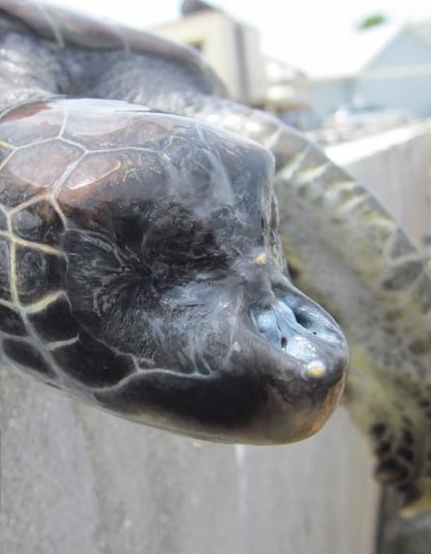
Cayman Turtle Farm undergoes review
 (CNS): An independent review of the Cayman Turtle Farm (CTF) began Monday, following worrying revelations by an animal activist group. A four member team, which includes vets and scientists but no animal welfare experts, will be at the site in West Bay until Wednesday, and their report is expected in January. The aim of the inspection is to determine whether standards of care meet those required to ensure that the operation is conducted in a “humane manner” and examine standards of husbandry. Although the World Society for the Protection of Animals (WSPA) uncovered a number of major concerns at the farm in a report published earlier this year, the animal welfare group has not been invited to take part in this review. The group raised concerns that the team of inspectors may be compromised.
(CNS): An independent review of the Cayman Turtle Farm (CTF) began Monday, following worrying revelations by an animal activist group. A four member team, which includes vets and scientists but no animal welfare experts, will be at the site in West Bay until Wednesday, and their report is expected in January. The aim of the inspection is to determine whether standards of care meet those required to ensure that the operation is conducted in a “humane manner” and examine standards of husbandry. Although the World Society for the Protection of Animals (WSPA) uncovered a number of major concerns at the farm in a report published earlier this year, the animal welfare group has not been invited to take part in this review. The group raised concerns that the team of inspectors may be compromised.
The team includes Dr. Annette Broderick, a Senior Lecturer in Conservation Biology who has worked with the Farm in the past, and Professor Brendan Godley, a marine conservation scientist and qualified vet. Mt. Godley has already conducted a review of the farm in the past, which may be what the WSPA has said could lead to bias.
In addition, the animal rights activists said that the reviewers are planning to compare the practices employed at the CTF with standards of practice in other “domestic livestock production facilities”.
However, the WSPA has said that, as green sea turtles are not domesticated animals, comparing their production with standards applied to intensive farmed chickens is inappropriate. It has also raised concerns that the welfare of turtles is not part of the review.
In correspondence with the WSPA recently, Tim Adam, managing director of the turtle farm, said that the inspectors are internationally known sea turtle experts and the farm believes they willconduct a fair inspection.
Mr. Adam said, “It is important for the inspection team to maintain its independence and there would likely be a perception of bias if a representative of WSPA, which has campaigned against the CTF, were added. Indeed none of our staff from the CTF will be on the inspection team, since that also would likely lead to the report being discredited as biased.”
Disappointed that it has been excluded from the “independent” review of the Farm and surprised that two of the participants in what is being billed as an “independent” review have close professional ties to the Cayman Turtle Farm, the WSPA said Monday that it had 'severe concerns' that the independence of the review is already compromised and that the welfare of the sea turtles will not be at the heart of this inspection.
“We don’t believe this is either in the best interests of the farm or will provide the Caymanian people with the independent assurances they are demanding, that the Farm is managing the turtles properly,” the WSPA said in a statement. “However we genuinely hope – in the interests of the turtles – to be proven wrong in this instance and that the farm will proceed with total transparency and move to involve, if not us, another leading world-renowned global animal welfare organisation with the expertise to usefully input in to this assessment.”
According to the terms of reference, the inspectors will examine: water quality; stocking densities; treatment and prevention of disease and injury; levels and causes of mortality; levels (if any) of severe injuries; levels (if any) of congenital deformities; handling of animals by guests (including safety of both animals and guests); slaughter methods and practice.
The scientists are also being asked to suggest any reasonable steps by which animal husbandry and care might be improved at thefarm and to comment on the contribution the CTF makes to conservation of turtle species. The terms of reference also indicate that the inspection will be made on the ‘basis of the standards of practice that would apply to a comparable intensive livestock production' in facilities in the UK or USA.
In his previous review of the old Cayman Turtle Farm site in 2002, Professor Godley had noted some concerns at the farm regarding the feed, diseases and mortality rates, but had stated that the standards were “sufficiently high” to meet CITES requirements.
CNS has contacted the CTF for comment regarding the questions surrounding the independence of the inspectors and the failure to include an animal welfare expert in the team, but is still awaiting a response.
See Prof Godfrey’s earlier report below and details of the review team.
See related story on CNS: Report-slams-turtle-farm
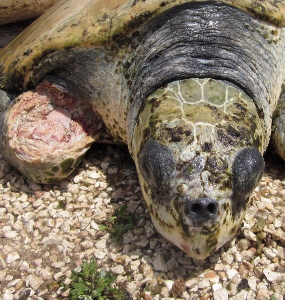
Turtle farm position at odds with premier, say activists
 (CNS): The international animal rights group which is campaigning to turn the Cayman Turtle Farm into a conservation attraction has said that the farm management appears to be at odds with the Cayman premier’s position that he was taking the evidence presented about the farm seriously. In a letter sent to the director Tim Adam earlier this month, Dr Neil D'Cruze from the World Society for the Protection of Animals said that the charity was surprised, given the premier’s admission that both he and the farm were taking the evidence of WSPA seriously, that the farm had denied the findings and had continued to ignore the charities concerns and offers of assistance.
(CNS): The international animal rights group which is campaigning to turn the Cayman Turtle Farm into a conservation attraction has said that the farm management appears to be at odds with the Cayman premier’s position that he was taking the evidence presented about the farm seriously. In a letter sent to the director Tim Adam earlier this month, Dr Neil D'Cruze from the World Society for the Protection of Animals said that the charity was surprised, given the premier’s admission that both he and the farm were taking the evidence of WSPA seriously, that the farm had denied the findings and had continued to ignore the charities concerns and offers of assistance.
In a bid to keep lines of communication open with the CTF, as the campaign to stop the farming of the turtles and develop a world class conservation facility grows, WSPA has again offered to help. The charity admits that it believes there is there is no humane way to commercially produce green sea turtles, and as a result, it says it is seeking the swiftest and most effective way to address the welfare concerns raised in its research through collaboration with the CTF.
“We have gone to great lengths over the last year to gather the required evidence, speak with all of the relevant stakeholders and provide the time required for them to thoroughly consider our proposed collaboration on this issue. As you will know, we have repeatedly said that our strong preference is for resolving the situation co-operatively. I would like to repeat that preferred choice to you today,” D’Cruze writes.
“It is disappointing that that the CTF and Caymanian Government have isolated themselves by refusing to accept that our welfare concerns are genuine and based upon tangible evidence. However, as always, we would welcome the opportunity to meet with you to determine how we can work together. Indeed as you will be aware, the UK Government are now urging us to work together to reach positive solutions, but we cannot do this unless you enter into dialogue with us.”
In the letter dated 2 November, D'Cruze also asks the farm’s director for more details on the independent review that he has publicly stated the farm will be undertaking sometime next month in response to the damning findings of WSPA. He also asked if the farm would permit the WSPA to participate and share its experience during the review.
“WSPA understands that the CTF is of great importance to the Cayman Islands and many people want to make it a success,” the charity stated. “WSPA believes that the farm can change for the better — it can become a humane and sustainable operation that meetsits conservation aims; is safe for visitors; more economically viable; and a genuine source of pride for the Cayman Islands.”
More than 87,000 people from at least 150 different countries have signed the on-line petition and several other international non-governmental organizations and charities have offered their support to the campaign. WSPA said that there was a strengthening tide of public, academic, and political opinion against the CTF as a consequence of what it uncovered and asked the Farm director to work with them to transition the farm into a conservation facility.
In a damning report last month the WSPA went public with its findings in both the local and international media, which caused a barrage of bad publicity for the Cayman Turtle Farm. The researchers from the internationally respected organization documented a catalogue of problems, from diseases, congenital defects, cannibalism, inhumane treatment and overcrowding.
Since then, the farm has categorically denied the accusations and claim conservation credentials as a result of the research done there. It stated that no complaints have ever been made about inhumane treatment, even though three hundred turtles were left to die in the sun a few weeks ago when a sea pipe leak drained one the holding tanks.
The Turtle Farm absorbs a subsidy from the public purse of as much as $10 million annually since it was redeveloped in 2005. The premier has persistently claimed that the failure of the newer facility is because there should have been a pier in West Bay to bring cruise passengers directly to the farm.
Related article on CNS:
See full WSPA letter to CTF below.

Turtle Farm denies cruelty, disease or genetic defects
 (CNS): In the face of further accusations about disease, cruelty and genetic abnormalities at the Cayman Turtle Farm, officials released a second statement Thursday denying the allegations and claiming conservation credentials. As the international campaign against the farm mounts, CTF said there were plans to release 150 turtles this year to add to the 31,000 that have been released during the farm’s 40 plus year history. Following more damning criticism this week, this time from the Sea Turtle Conservancy (STC), the CTF called the allegations “at best misleading and at worst untrue,” claiming that significant strides had been made to eradicate disease. (Photo: A Turtle with no eyes taken by the WSPA team at the farm earlier this year)
(CNS): In the face of further accusations about disease, cruelty and genetic abnormalities at the Cayman Turtle Farm, officials released a second statement Thursday denying the allegations and claiming conservation credentials. As the international campaign against the farm mounts, CTF said there were plans to release 150 turtles this year to add to the 31,000 that have been released during the farm’s 40 plus year history. Following more damning criticism this week, this time from the Sea Turtle Conservancy (STC), the CTF called the allegations “at best misleading and at worst untrue,” claiming that significant strides had been made to eradicate disease. (Photo: A Turtle with no eyes taken by the WSPA team at the farm earlier this year)
Despite the photographic evidence and other scientific peer reviewed analysis and research presented by the Word Society for the Protection of Animals (WSPA) recently, the farm also denied that any turtles found at the Cayman Turtle Farm had any of the genetic defects alleged.
“Cases of genetic mutation at the Cayman Turtle Farm are extremely rare, and seem to be in line with the incidence of similar defects in the wild populations,” the Turtle Farm said in another lengthy press statement in the face of the increasing international criticisms.
As the STC announced its backing for the WSPA campaign (which had 49,208 signatures at 8am Friday) to persuade the CTF to move to a purely conservation model and give up farming, it pointed to the dangers posed by releasing farmed turtles into the wild.
“Well-documented diseases found primarily in captive turtles can be spread to wild populations,” the world's oldest marine turtle research and conservation organization said. It said the release programme gives a false impression that conservation can be accomplished simply by breeding turtles in tanks and the releasing them.
“The Cayman Turtle Farm tries to promote its operation as something beneficial to wild turtle populations,” said David Godfrey, Sea Turtle Conservancy Executive Director. “Despite the lack of evidence that the turtle release program actually benefits the wild population, countless individuals around the world are led to believe that the program works and that it is a successful option for saving and restoring wild sea turtle numbers.”
Pushing back against the criticisms, the farm said it was now seeing solid returns on its conservation efforts as tagged adult females return to Cayman beaches to nest in increasing numbers. However, the CTF failed to note that less than a dozen female turtles have actually returned to local beaches.
Refuting allegations about diseases getting into wild populations, the Cayman Turtle Farm said it follows rigorous release protocols for all animals returned to the wild. “Juvenile Green Sea Turtles are selected for release; health checked and given appropriate preventative treatments; and quarantined for 30 days,” it said.
The farm pointed to 150 research papers released over the years, as well as requests for educational internships and research partnerships in support of its claimed conservation efforts.
Even though there have been a number of reported problems in the past regarding the hatch rates, the CTF said 2012 had “been a very positive nesting season” for the Farm, with over 41,000 eggs laid at the facility and an increase in this year’s hatch rate.
“Through recent satellite-tagged turtle releases, we are also able to capture data on the behaviour of Green sea turtles released into the wild – where they go and what they do, and thus far we have seen that the satellite-tracked turtles we have released into the wild have adapted well to their new habitat,” the Farm said.
“The Cayman Turtle Farm tags turtles with a 'living tag' which was developed by Professor John Hendrickson and Lupe Hendrickson of the University of Arizona. This tagging method involves the auto grafting of a small, white dot of belly shell onto the turtle's dark coloured back. This is done when the turtle is only a few days old. As the animal grows, the dot grows with it. This tagging method is tremendously significant as it is the only method whereby a tiny sea turtle hatching may be identified as a 300 pound adult more than 15 years later on a nesting beach.”
Denying any animal cruelty, officials at the Cayman Turtle Farm said animal husbandry was in accordance with internationally accepted humane standards. “We are trying to conserve these turtles, and increase their numbers. Our efforts are devoted to their well-being and care,” the Farm stated.
However, it made no reference to the allegations made by STC about the 300 green turtles that perished recently as a result of them being left to burn in the sun when a holding tank malfunctioned during a leak repair.
The CTF said, however, that its primary focus was on a “unique, safe and sustainable tourism attraction” that also supported the research and conservation of sea turtles. “The Cayman Turtle Farm looks forward to directly addressing the WSPA’s allegations, and by extension the STC’s support of this campaign, with an independent review of our operations scheduled for December 2012,” the Farm officials added.
It is not clear if the review will also look at the financial operations at the farm which continues to draw down a subsidy from government each year of in excess of CI$10 million. Despite charging visitors to the facility an entrance fee andhaving tripled the price of the meat it produces in 2010, the facility continues to be a significant drain on public resources.
See full statement from CTF below.
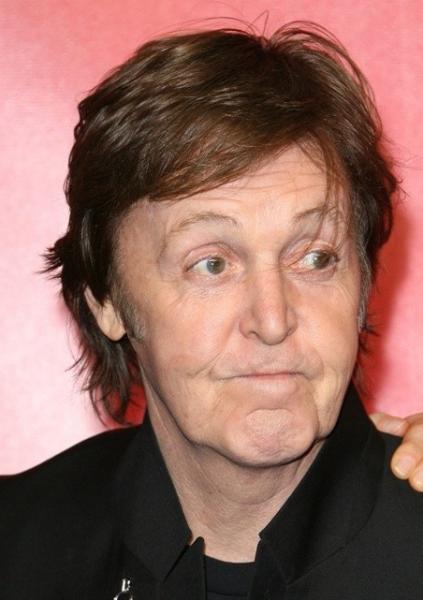
Beatle backs call to stop turtle farming in Cayman
 (CNS): One of the world’s most famous musicians, Paul McCartney, has offered his public support to the international campaign being spearheaded by the World Society for the Protection of Animals (WSPA) to stop turtle farming in the Cayman Islands. The former Beatle member announced on his website and ‘tweeted’ his backing for the campaign as he asked his fans to also support the goal to stop the farming and move towards conservation. Meanwhile, the Sea Turtle Conservancy has also joined the WSPA in asking the Cayman Turtle Farm to end the farming and is encouraging members of the public to take action.
(CNS): One of the world’s most famous musicians, Paul McCartney, has offered his public support to the international campaign being spearheaded by the World Society for the Protection of Animals (WSPA) to stop turtle farming in the Cayman Islands. The former Beatle member announced on his website and ‘tweeted’ his backing for the campaign as he asked his fans to also support the goal to stop the farming and move towards conservation. Meanwhile, the Sea Turtle Conservancy has also joined the WSPA in asking the Cayman Turtle Farm to end the farming and is encouraging members of the public to take action.
Tweeting about the campaign on Wednesday, McCartney said there was no humane way to farm sea turtles. “Support @WSPA campaign to #stopseaturtlefarming,” McCartney posted on his Twitter account.
The WPSA’s campaign is attracting worldwide attention and at 2pm on Thursday 46,881 people had signed a petition on the website, which was posted only at the weekend.
A spokesperson for Sea Turtle Conservancy, which is based in the US, said Thursday that it had objected repeatedly to the Cayman Turtle Farm’s release of captive-raised turtles into the wild because of the potential impact on wild populations in the broader Caribbean.
“Well-documented diseases found primarily in captive turtles can be spread to wild populations,” the world's oldest marine turtle research and conservation organization said. “The turtles that are breeding at the Cayman Turtle Farm originate from many different oceans and nesting colonies, which means they have very different genetics. If their offspring are allowed to mix with and mate in the wild, it could have far reaching impacts on sea turtle navigation abilities and genetics.”
The group also said the release programme gives a false impression that conservation can be accomplished simply by breeding turtles in tanks and the releasing them.
“The Cayman Turtle Farm tries to promote its operation as something beneficial to wild turtle populations,” said David Godfrey, Sea Turtle Conservancy Executive Director. “Despite the lack of evidence that the turtle release program actually benefits the wild population, countless individuals around the world are led to believe that the program works and that it is a successful option for saving and restoring wild sea turtle numbers.”
Godfrey also pointed to the recent death of about 300 green turtles at the Farm during the repair of a leaking seawater pipe and said the turtles had been left to die in the heat.
“In essence, once the tank was drained, the turtles were left piled on top of each other to cook to death under the Cayman sunshine,” said Godfrey. “It’s time to turn things around at the Cayman Turtle Farm, and there really is an opportunity to do something positive for sea turtles at this historical site.”
The group said it was joining the World Society for the Protection of Animals in publicly asking the Cayman Turtle Farm to permanently end sea turtle farming and encouraging members of the public to take action at www.stopseaturtlefarm.org
Related articles on CNS:

Report slams Turtle Farm
 (CNS): A global animal welfare charity has published a damning report on the Cayman Turtle Farm, which suggests that there are some serious shortcomings at the facility. The report by the World Society for the Protection of Animals (WSPA) found that the Farm is not meeting the welfare needs of the animals under its care and poses a threat not just to those animals but the wild population as well. It points to very poor conditions, including water quality, the turtles’ diet, disease, congenital defects in the captive bred creatures and overcrowding in the tanks. Criticising the organisation, government has denied the allegations and announced plans for an independent audit of CTF.
(CNS): A global animal welfare charity has published a damning report on the Cayman Turtle Farm, which suggests that there are some serious shortcomings at the facility. The report by the World Society for the Protection of Animals (WSPA) found that the Farm is not meeting the welfare needs of the animals under its care and poses a threat not just to those animals but the wild population as well. It points to very poor conditions, including water quality, the turtles’ diet, disease, congenital defects in the captive bred creatures and overcrowding in the tanks. Criticising the organisation, government has denied the allegations and announced plans for an independent audit of CTF.
Government and the CTF accused WSPA on Friday of making “spurious” and “sensational” allegations as part of its goal is to end the commercial farming operation and change the local culture because of a failure to understand Cayman.
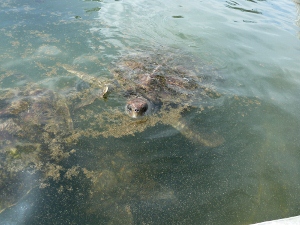 The Turtle Farm costs the public purse some CI$10 million in subsidies every year and the price of turtle meat which it produces has increased significantly. According to the research conducted by the WSPA, it costs each tax payer almost CI$12,000 to produce a turtle for meat. WSPA said it presented its report to the Cayman Turtle Farm much earlier this year but the CTF has not released or commented on the findings until now, which has come as a result of the WSPA’s decision to go public with its campaign to persuade government to change the farm to a real conservation facility.
The Turtle Farm costs the public purse some CI$10 million in subsidies every year and the price of turtle meat which it produces has increased significantly. According to the research conducted by the WSPA, it costs each tax payer almost CI$12,000 to produce a turtle for meat. WSPA said it presented its report to the Cayman Turtle Farm much earlier this year but the CTF has not released or commented on the findings until now, which has come as a result of the WSPA’s decision to go public with its campaign to persuade government to change the farm to a real conservation facility.
Government officials from both the premier’s ministry and the Turtle Farm released statements late Friday evening denying all the accusations and criticising the animal welfare organisation. It said it had never been accused of these things before and there was no evidence for the WSPA’s findings.
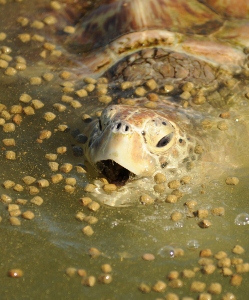 “The CTF is subject to regular inspections by government entities, as well as independent external assessors, to ensure that it complies with health and safety regulations and provides a high quality and responsible tourism experience,” government said. “Prior to the claims by the WSPA, the Cayman Islands Government has never been confronted with allegations or claims of evidence of animal cruelty, nor has there been any suggestion whatsoever of risks to the health and safety of visitors who enjoy the attraction.”
“The CTF is subject to regular inspections by government entities, as well as independent external assessors, to ensure that it complies with health and safety regulations and provides a high quality and responsible tourism experience,” government said. “Prior to the claims by the WSPA, the Cayman Islands Government has never been confronted with allegations or claims of evidence of animal cruelty, nor has there been any suggestion whatsoever of risks to the health and safety of visitors who enjoy the attraction.”
However, the WSPA report includes details supported by damning pictures. The organisation also has film footage to support its claims showing disease, overcrowding, poor water conditions and many other problems at the facility. Calling for the farm to be converted into a conservation facility and to cease the commercial farming, which the activists say has been a failure, the WSPA has offered to assist in the transition, but it states that the Farm has not responded to that offer.
Government claims that the Turtle Farm has had discussions with the charity, which is when it agreed to independent examination of the WSPA’s claims.
“Notwithstanding the preponderance of evidence to the contrary, the allegations by the WSPA are being taken seriously,” government said, adding it that it would conduct an audit of the farm operations and the welfare of the animals in December. However, it said changing the model of the farm would require a political decision.
“In all meetings and communications with the WSPA thus far, it has been clearly stated that the decision to alter the business model and objectives of the Cayman Turtle Farm would require a decision by the Cayman Islands Cabinet, and a timeline was agreed and subsequently adjusted by both parties to enable these high-level discussions to take place,” the farm said in a statement released Friday afternoon.
But instead, the farm claimed, the WSPA has “embarked on a smear campaign to coerce the Turtle Farm to submit to the WSPA’s demands”, even though “their allegations are unfounded, erroneous and sensationalised,” the statement read.
The Turtle Farm said it found no evidence of the kinds of injuries or defects among the turtles that the WSPA is listing in its report. “Rather, we have instead succeeded in maintaining the health and well-being of our turtle population through established veterinary treatment protocols and methods,” it said.
However, for some time there have been major concerns about the farm’s hatch ratings, the death of hatchlings and other problems regarding the quality of the water and feed. More recently, a tank full of 300 turtles died as a result of some technical fault in a tank during repairs to a leak in the farm’s main pipe. A full explanation of what happened has not yet been given to the tax-payer.
The WSPA has a number of pictures clearly showing poor water quality, as well the over-crowded conditions, disease and defects in the population of turtles at the farm. It says that turtles need substantial amounts of good quality water but the tanks at the farm are not cleaned regularly, leaving uneaten food and voided faeces that quickly contaminate the living environment.
“The result is a foul mix of water, debris and pathogenic microorganisms including bacteria and viruses that pose a significant threat to turtle welfare,” the report found.
Among other criticisms WSPA notes that the turtles which would normally eat sea grass as adults in the wild are fed solely on a fish food pellets. It also describes the problems associated with the arbitrary handling of turtles by members of the public. It said this is stressful for the turtle and can lead to injury if the inexperienced handler drops a struggling animal. The report warns that with traces of disease and pathogens on the turtle visitors could also get sick.
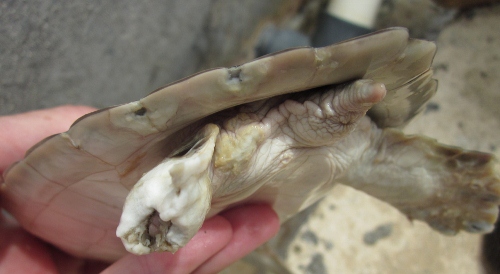 The WSPA says it saw significant evidence of congenital defects throughout the farm. “Many of these individuals exhibit anophthalmia (absence of one or both eyes) with marked skeletal deformities,” the report states. “In the wild, these deformities would most likely have resulted in early natural mortality … in the farm, their blindness renders them even more susceptible to injury and disease as a result of their reduced ability to feed and avoid co-occupant aggression.”
The WSPA says it saw significant evidence of congenital defects throughout the farm. “Many of these individuals exhibit anophthalmia (absence of one or both eyes) with marked skeletal deformities,” the report states. “In the wild, these deformities would most likely have resulted in early natural mortality … in the farm, their blindness renders them even more susceptible to injury and disease as a result of their reduced ability to feed and avoid co-occupant aggression.”
Although the turtle farm has claimed that it makes a significant contribution to conservation because of the release programme, the report states that the CTF’s conservation efforts may be negligible or even detrimental to wild turtle populations.
“Following a detailed assessment, WSPA also has severe concerns regarding the potential impact of the Cayman Turtle Farm on wild sea turtle conservation efforts,” it stated.
“We want to help the farm change for the better,” Dr Neil D’Cruze, the WSPA Wildlife Campaign Leader said in the wake of the release of the report. “But its unwillingness to meet us halfway is posing a great challenge. There’s a reason that CTF is the last turtle farm in the world – it’s an outdated model which no longer does justice to the Cayman Island’s turtle heritage.
“WSPA wants to work with the farm to turn the facility into a place that Caymanians can be proud of. Science and society moves on and WSPA would like to help CTF make a positive change, for the turtles, for tourism and for the island,” he added.
See statements from government and the WSPA report below.
See more on the campaign and images here
All pictures provided by WSPA.
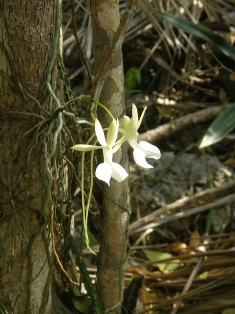
Ghost orchid blooms at the Turtle Farm
 (CNS): One of the world’s rarest flowers, the mysterious Ghost Orchid, is in bloom at the Cayman Turtle Farm, officials announced in a release Wednesday. Grand Cayman's Ghost Orchid (Dendrophylax fawcetti) is a rare, endangered and endemic native plant. The flower is a small to medium, pale cream-coloured blossom, but still subtly beautiful- especially against a leafy background. This particular orchid is often very difficult to cultivate outside of its natural habitat. The farm has two which were donated by the Orchid Society in late 2006 having been rescued from clearing work going on at the Ironwood Forest in George Town. The orchids were re-attached to two trees growing in the Blue Hole natural trial and two years later began blooming.
(CNS): One of the world’s rarest flowers, the mysterious Ghost Orchid, is in bloom at the Cayman Turtle Farm, officials announced in a release Wednesday. Grand Cayman's Ghost Orchid (Dendrophylax fawcetti) is a rare, endangered and endemic native plant. The flower is a small to medium, pale cream-coloured blossom, but still subtly beautiful- especially against a leafy background. This particular orchid is often very difficult to cultivate outside of its natural habitat. The farm has two which were donated by the Orchid Society in late 2006 having been rescued from clearing work going on at the Ironwood Forest in George Town. The orchids were re-attached to two trees growing in the Blue Hole natural trial and two years later began blooming.
After being dormant for almost two years, the first of the Turtle Farm’s Ghost Orchids bloomed in early 2008 and since then, both orchids have bloomed each year in late April or early May.
The Ghost Orchid is a unique flower, as the single pale blossom grows from a strange-looking epiphyte that more resembles a creeping vine or some sort of root system embedded in the bark of a tree, rather than an actual plant or what most people perceive an orchid plant to look like. It often seems to be suspended in mid-air, hence the name “Ghost Orchid.”
“This unique form makes the Ghost Orchid difficult to locate in the wild among the leaves, branches and vines of their arboreal woodland habitat. It is a unique and exciting natural phenomenon to observe on the Blue Hole Nature Trail,” said Geddes Hislop, who is the Curator -Terrestrial Exhibits & Education Programmes at the Cayman Turtle Farm: Island Wildlife Encounter.
The Ghost Orchid’s bloom will usually last for about two weeks. It is suspected that the flower is pollinated by a large nocturnal sphinx moth that uses its long proboscis to reach into the deep flower to feed on its nectar. This orchid is a distant relative of the African and Indian Ocean genus Angraecum. Botanists theorise that orchid seeds, blowing like dust, crossed the Atlantic at least once and successfully colonised new habitat.